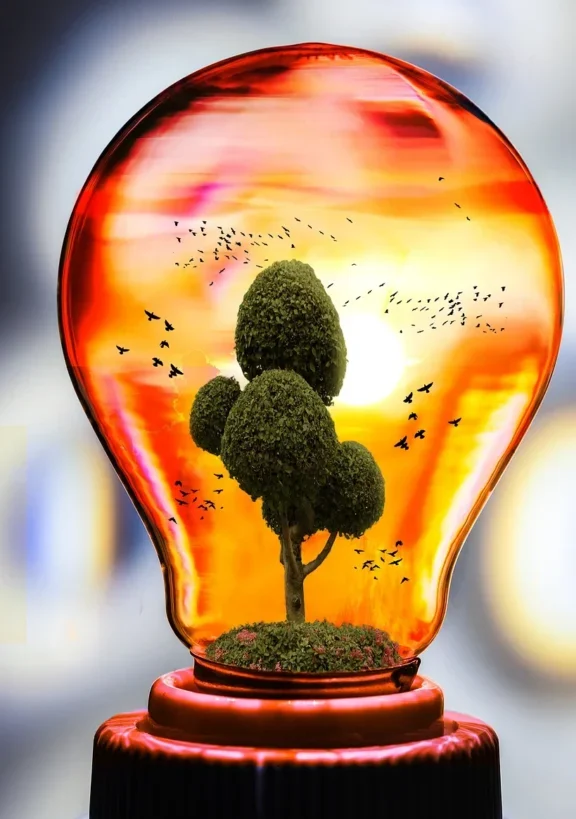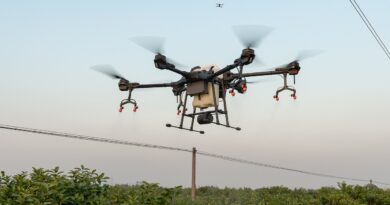The Role Of Artificial Intelligence in sustainable agriculture

Introduction
For thousands of years, agriculture has served as the foundation of human civilization, sustaining billions of people and generating revenue. Agriculture, meanwhile, is currently confronting unheard-of difficulties as the world’s population rises. Farmers and the sector as a whole are under tremendous strain due to climate change, limited resources, and an effort to reduce their impact on the environment. In this scenario, artificial intelligence (AI) is demonstrating its potential as a potent ally in the fight for sustainable agriculture.
This article explores the various ways in which AI is altering agricultural methods, maximizing resource use, and encouraging environmentally friendly agriculture.
How AI is revolutionizing sustainable agriculture

Here are some key roles for AI in reshaping farming practices, optimizing resource utilization, and promoting environmentally responsible agriculture:
Agriculture Precision
- Precision farming is one of the key ways artificial intelligence is changing agriculture. Utilizing traditional agricultural techniques, water, herbicides, and fertilizers are frequently applied uniformly throughout huge areas. This strategy is ineffective and can result in excessive resource usage, soil erosion, and pollution. AI changes this by enabling precision agriculture.
Farmers may obtain current data on soil quality, moisture levels, and crop health by using AI-powered sensors, drones, and satellite photography. Farmers may deploy resources precisely where and when they are required with the use of this information. AI, for example, may prescribe exact watering schedules, lowering energy and water usage. Additionally, it may pinpoint regions where insect infestations or nutritional deficits are present, enabling targeted treatments and lowering the need for pesticides.
Crop observation and detection of diseases
- It is essential to identify crop diseases and pests early in order to stop broad infestations and minimize the need for chemical treatments. Artificial intelligence (AI) systems can analyze images and data from automated field sensors or drones to identify insignificant signs associated with crop stress or ailments that a human eye would definitely detect. These technologies are capable of quick reactions, enabling farmers to preserve their crops in sufficient time.
In addition, AI can forecast disease outbreaks based on historical data, climatic trends, and environmental factors. Through the use of preventative techniques, farmers are able to lessen the total ecological impact of their farming activities.
Sustainable Pest Management
- Sustainable pest management also heavily relies on AI. The ecology and public health are both harmed by this strategy, in addition to the fact that it is expensive. AI has the ability to alter the treatment of pests by providing more specialized and sustainable solutions.
AI could assist farmers in turning IPM, or integrated pest management, strategies into action by tracking and analyzing data on insect populations and environmental variables. To be able to manage pest populations without using toxic substances, IPM encompasses a number of techniques, including biological control and natural predators. This tactic encourages natural harmony, slows the emergence of pests that are resistant to pesticides, and lowers the flow of chemicals into ecosystems.
Supply chain administration
- Agriculture’s pledge of sustainability stretches beyond the land. AI can streamline supply networks, cutting down on carbon emissions and food waste. Crop production forecasting by AI algorithms permits more effective transportation and harvesting planning. AI reduces spoilage and energy consumption in the transport and storage of agricultural products by anticipating demand and optimizing distribution routes.
Additionally, AI-driven blockchain technology can enhance transparency in the supply chain, providing consumers with detailed information about the origin of their food. This transparency encourages sustainable practices as consumers increasingly prioritize products with low environmental footprints.
Management of Soil Health
- Sustainable agriculture relies on fertile soil, yet soil degradation remains an epidemic on a global level. By providing insights into the soil’s composition and nutrient levels, artificial intelligence may assist farmers in preserving and enhancing soil quality. Artificial intelligence (AI)-driven soil management systems can suggest crop rotations and soil amendments that maximize fertility and reduce erosion, thus diminishing consumer appetite for synthetic fertilizers.
Water Resource Management:
- Sustainable agriculture, particularly in areas with limited water supplies, depends on effective water management. Artificial intelligence (AI) irrigation systems enhance water utilization by using sensor and meteorological data. In order to avoid overwatering and conserve water resources, these devices may modify irrigation schedules in real-time. AI helps farmers manage water more sustainably by minimizing water waste.
Weed Identification and Management:
- Herbicide usage is a common practice in conventional weed management methods, resulting in an enormous expense for farmers. AI-powered image recognition technology can distinguish between crops and weeds with remarkable accuracy. As a result, there is less chemical use and less environmental damage due to targeted herbicide application where it is warranted.
Climate-Resilient Crop Breeding:
- Resilient agriculture: Due to the potential effects of changing weather patterns and extreme events on crop productivity and quality, climate change poses an imminent risk to global agriculture. AI is assisting in the creation of crop types that are climatically adaptable. For the purpose of identifying genetic features that might improve crop resilience, machine learning algorithms evaluate enormous databases of plant genetics, climatic data, and growth trends. As a result, crop development that is more adapted to altering climate variables can proceed swiftly in the breeding process.
Carbon Farming and Carbon Sequestration:
- AI can assist in carbon farming efforts by helping farmers implement practices that sequester carbon in the soil and vegetation. By analyzing data on farming practices, crop rotations, and land management, AI can provide recommendations for carbon sequestration strategies. This contributes to the reduction of greenhouse gas emissions from agriculture, aligning with broader sustainability goals.
Labor optimization:
- Agriculture often needs an abundance of labor, and the absence of labor could render it challenging to keep being sustainable. Robotics and automation powered by AI are being employed more and more for tasks like weeding and harvesting fruit. These innovations can operate continuously and lessen the need for physical labor, increasing production while perhaps reducing expenses and labor-related issues.
Biodiversity Conservation:
- Artificial intelligence (AI) can support attempts to conserve biodiversity on farms. AI may assist farms with the implementation of methods that maintain and increase biodiversity by tracking wildlife and plant species using cameras and sensors. The preservation of natural ecosystems, the planting of cover crops, and the creation of wildlife-friendly corridors are a few instances that utilize these strategies.
Market Forecasts and Risk Management:
- Predictive analytics powered by AI can help farmers make well-informed choices about when to sow, harvest, and sell their products. AI may assist farmers in optimizing their output and decreasing the risk of crop loss owing to variables like unfavorable weather conditions or market swings by evaluating market trends, weather forecasts, and historical data.
Waste Reduction:
- AI systems can help farmers reduce waste by predicting optimal harvesting times, sorting produce for quality, and minimizing post-harvest losses. This not only conserves resources but also reduces the environmental impact associated with disposing of spoiled or unused crops.
Energy Efficiency:
- AI can optimize energy usage on farms by controlling and monitoring energy-intensive processes such as heating, ventilation, and cooling. Smart systems can adapt to changing environmental conditions and reduce energy consumption, contributing to sustainability and cost savings.
Sustainable Aquaculture:
- AI is being applied to aquaculture (fish and seafood farming) to optimize feeding, water quality, and disease management. AI-powered monitoring systems can help reduce overfeeding, improve fish health, and minimize environmental pollution from excess feed and waste.
Aquaponics and Hydroponics Management:
- In aquaponics and hydroponics systems, artificial intelligence (AI) is utilized to optimize fertilizer supply and monitor water quality. These soilless farming techniques increase resource efficiency while minimizing agriculture’s environmental impact.
Circular Agriculture:
- AI can assist in the implementation of circular agriculture practices, where waste from one part of the farming system becomes a resource for another. For example, crop residues can be used as organic mulch or converted into bioenergy.
Blockchain for Supply Chain Transparency:
- AI and blockchain technology are combined to create transparent and traceable supply chains. Consumers can trace the origin and journey of their food products, ensuring ethical and sustainable sourcing.
Crop Prediction for Smallholder Farmers:
- AI-driven mobile apps and SMS services provide smallholder farmers in developing countries with crop yield predictions and weather forecasts. This empowers them to make informed decisions and adapt to changing conditions, improving their livelihoods and sustainability.
Digital twins for farms:
- Using AI, it is possible to generate digital representations of farms, which is similar to the idea of digital twins in engineering. With the help of these digital twins, farmers may experiment with alternative approaches and maximize resource utilization, eventually fostering sustainability.
In conclusion, artificial intelligence is a versatile tool that is reshaping agriculture into a more sustainable and environmentally responsible industry. Its applications span from precision farming and resource management to supply chain optimization and biodiversity conservation. As technology continues to advance, the integration of AI into agriculture holds the potential to address the complex challenges of food production while safeguarding the planet for future generations.





How can I find out more about it?
Thank you for sharing this article with me. It helped me a lot and I love it.
One Click Vids is my secret weapon! It’s boosted my YouTube and TikTok presence and helped me pocket major cash with affiliate offers. Jump on this—it’s affordable and a breeze to navigate!
Pingback: Role of Bees in Organic Farming and Pollination..
Pingback: Data Privacy in the Digital Age: Unraveling GDPR and CCPA